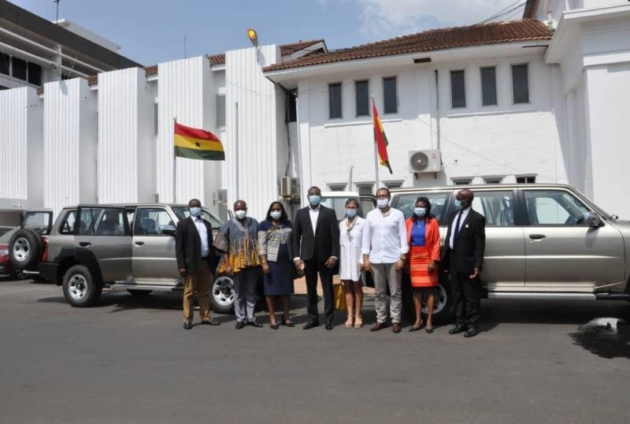The Accountability, Rule of Law and Anti-corruption Programme (ARAP) has handed over two vehicles to Commission on Human Rights and Administrative Justice (CHRAJ).
ARAP, an EU funded programme, implemented by the Spanish public foundation FIIAPP has been supporting the Commission during the last four years.
These vehicles will improve the capacity of CHRAJ to conduct monitoring activities related to the implementation of the National Anti-Corruption Action Plan (NACAP) on the ground.
A statement issued in Accra by Mrs Ana Sánchez, the ARAP Team Leader, said corruption continued to be a problem that had permeated every sector of global economies.
It said with its devastating effects, it undermined sustainable development and was an affront to human rights.
“It further distorts markets, competition, institutions as well as entire governance structures,” it said.
The statement said arguably, corruption was identified as a major root cause of poverty, deprivation and underdevelopment.
It said in the particular case of Ghana, the high prevalence of corruption has resulted in poor service delivery and a lack of access to necessities of life.
“Corruption is equally a threat to Ghana’s democratic ideals (particularly the rule of law, justice for all and equality before the law,” it said.
Ghana’s anti-corruption policy, the National Anti-Corruption Action Plan (NACAP) is coordinated and monitored by the Commission in collaboration with the National Development Planning Commission (NDPC).
Through the Monitoring Committee (MONICOM), composed of the above institutions, the vehicles will strengthen the committee's work in monitoring and evaluating the implementation of the NACAP by the Implementing Partners in the regions.
The ARAP supports the efforts of the government in its fight against corruption.
The objective of the programme is to contribute to current reform processes to reduce corruption and improve accountability, and compliance with the rule of law, particularly when it comes to accountability, anti-corruption and environmental governance.
It does so through support key institutions, while at the same time increasing the ability of the public, civil society organisations and the media to hold the government to account.
Latest Stories
-
Bawku conflict is a matter of great distress to me – Akufo-Addo
22 minutes -
Chef Failatu donates to Tamale Teaching Hospital on anniversary of cook-a-thon
42 minutes -
Inauguration of President-elect John Mahama: Key guidelines on seating, security and traffic
1 hour -
‘Gadgets4Ghana’ (G4G) launches donation drive to bridge digital divide
1 hour -
Bawumia eulogises late Ashanti Regional Chief Imam at final funeral rites
2 hours -
Wendy Shay’s One Night Stand serves revelers with electrifying performances
2 hours -
CCF supports community-led natural resource management in Densu Delta through CREMA awareness workshop
2 hours -
Volta NDC celebrates Prosper Bani’s appointment as National Security coordinator
2 hours -
The Power of Youth: Tanko Foundation’s commitment to empowering Volta Region
3 hours -
V/R Council of State aspirant congratulates Prosper Bani on appointment as National Security Team leader
3 hours -
Fire guts Kwadaso Wood market in Kumasi
10 hours -
GPL 2024/25: Gold Stars revive title hopes with win over Berekum Chelsea
10 hours -
We won’t entertain arrogant appointees – Deputy NDC Youth organizer warns
12 hours -
Akufo-Addo’s Aide-De-Camp in good shape after collapsing in Parliament
12 hours -
NPP notifies Parliament of its selected leaders for the 9th parliament
13 hours

